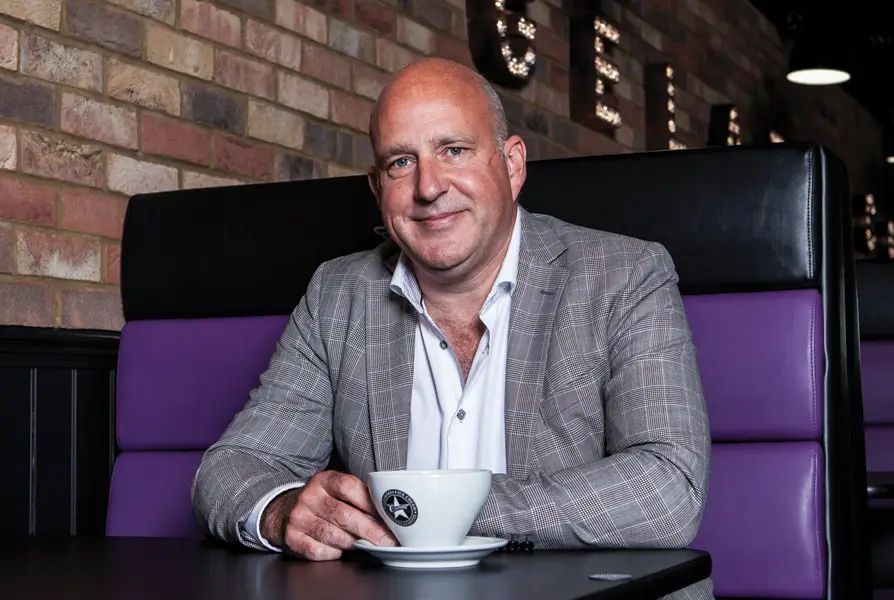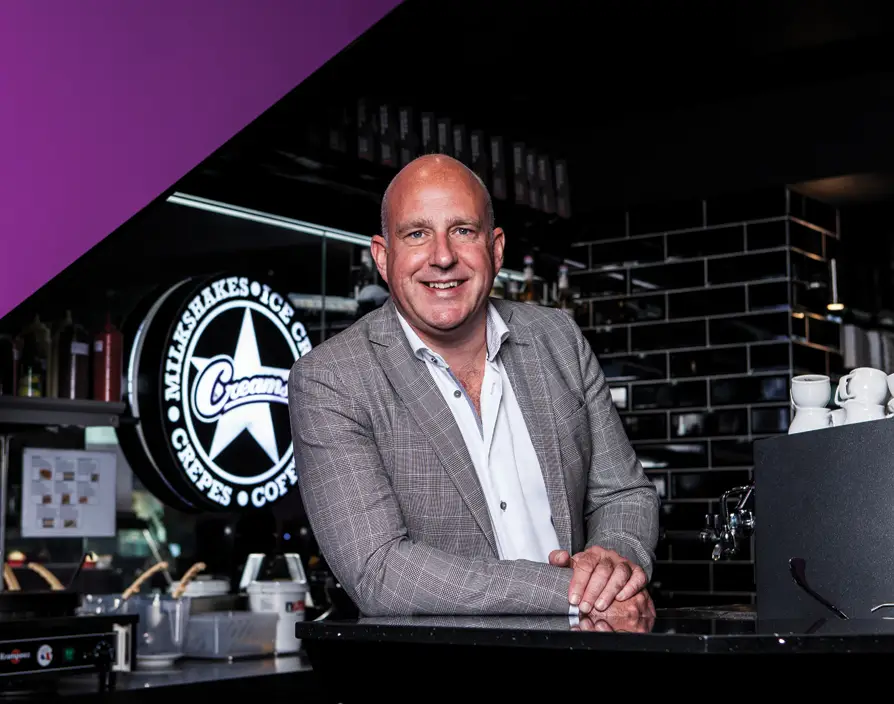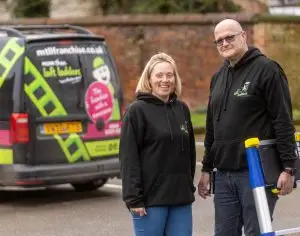Adapting a brand to a new market can be a tricky proposition for any businessperson but fortunately Handley Amos isn’t your average entrepreneur. Having helped translate foreign food brands Nando’s and Rossopomodoro to the British market and significantly scale their offerings, he has made a specialism of helping companies capture international markets. And now he has turned his sights on Creams Cafe, making it his mission as the dessert franchise’s new CEO to bring its gelato to the globe.
Thanks to his globetrotting parents, Amos is no stranger to the benefits that adapting to other cultures can bring. “My parents were obsessed with taking my brother and I travelling to see as much of the world as possible,” he says. “That was fantastic: it helps you understand very quickly that the world’s a relatively small place and there are so many opportunities out there.” Being of an entrepreneurial bent, his parents also had plenty of experiences building businesses and it was expected that he would join the family business when he finished his studies at the Northallerton Grammar School in North Yorkshire. However, having had a taste of the wider world, Amos had other plans. “Once I’d seen what was out there, I really wanted to get out and do something of my own,” he says. “I didn’t really want to stay in North Yorkshire: I loved the idea of living in London or abroad to widen my horizons.”
And having worked part-time as a waiter to make ends meet during his studies, Amos had already cooked up the perfect plan for his future career. “Everybody looked at restaurants like they were something you do while you were studying rather than taking it as a career,” he says. “But I didn’t see it that way: I saw it as a huge opportunity.” Moving to London, Amos quickly worked his way up from waiter through bartender to manager before relocating after two years to Cape Town in South Africa to help some friends manage a restaurant and bar they’d set up. Over the next five years the friends added four more brands to their portfolio, something that gave Amos invaluable experience in nurturing talent and scaling businesses. “It was after the end of apartheid and we were trying to educate a new part of the workforce and encourage them to come into catering,” he says. “And I absolutely loved it: I had an amazing time there.”
After five years, Amos was forced to return to London after he found himself unable to renew his visa. Fortunately, on his return to the British high street, he was greeted by a familiar sight from South Africa: Nando’s. “When I came back to London and was looking for my next challenge, Nando’s name came up,” he says. At the time, the grilled-chicken chain had just 12 stores throughout the UK and was looking to rapidly scale: after meeting with Amos, then UK managing director Robby Enthoven and HR director Julia Rosamond decided he was the perfect person to help Nando’s rule the roost. And their confidence in him proved well-founded: he rapidly helped to systematise the restaurant and adapt its model to the peculiarities of the UK market. “How we perceive things here is very different to South Africa,” Amos says. “In South Africa, they’re quite happy to wait nearly 20 minutes for a meal; in the UK, we think that’s outrageous.” Soon consumers were flocking to Nando’s and over the following 12 years the chain grew to 240 outlets.

But having gained an appetite for helping overseas brands beef up their British operations, when Amos was headhunted by Rossopomodoro, an Italian restaurant chain looking for someone to help grow its offering on these shores, he took to the opportunity with relish. “This one really appealed to me,” he says. “It was the largest chain of Italian restaurants in Italy, which is quite unusual in a market built on mama and papa operations.” At the point he came on board, Rossopomodoro had done little to adapt to the British market: unlike many restaurants he’d come across in his career, it didn’t yet use single-line kitchens – in which all utensils and work areas are laid out against a single wall – and to British eyes the length of its menu would suggest a focus on quantity over quality. “So we made the menu a lot more concise and put single-line kitchens in,” he says. “Not only did it grow from three to 12 in the UK but they replicated it in the Italian market and that was also very successful.”
Having gained a rep for helping restaurants reshape their offering for British palates, Amos decided to share his expertise with as many businesses as possible. “I had virtually built a specialism: helping foreign companies understand and adapt their models to the UK market,” he says. “So I set up a consultancy called the Light Hospitality.” However, the timing of the new company’s launch was unfortunate: within weeks of its launch in June 2016, Britain voted to leave the European Union, meaning there was a downturn in the number of brands looking to translate their offering for the UK. While Amos doubts this is anything more than a temporary blip, it did leave him looking for another project to get his teeth into while the market rallied. And this is when Creams Cafe came a-calling. “I hadn’t heard of it until then,” he says. “But the more I learnt about the brand, the more excited I got about what it could become and how it could develop.”
Creams began life when co-founders Adam Mani and Balal Aqil spotted a gap in the market for high-end gelato on the high street. After a couple of years of research and development and several trips to Italy to source an authentic product, in 2010 the first Creams opened and thanks to the entrepreneurs’ hard work it proved to be a smash. “The success of that was instant,” says Amos. “The second one did even better than the first, so did the third one and it just snowballed.” But the ice-cream innovators weren’t content with just serving up scoops of someone else’s product: before too long they invested in their own manufacturing facility and began importing high-quality ingredients so they could start generating gelato of their own. “Ever since, Creams has doubled in size every single year,” Amos says.
And there’s a good reason that the pudding parlour proved so popular: its artisanal approach to its menu. “Adam is really passionate about the brand and its food,” says Amos. “Really it all started from his creativity.” From its coconut gelato, mango sorbet and pineapple chunk sundae to its crumbled apple pie, custard and cinnamon waffle, Creams approaches consumers’ palates like an artist, blending all manner of flavours to produce icy artworks. And it has only grown bolder as time has gone by: recognising that hot desserts formed about 70% of its sales, it has created seasonal menus that concentrate more on cakes and crepes than cones. “We’ve also made sure that the menu has evolved: we change it three times a year now,” Amos says. “Bubble pop waffles is something we added six weeks ago and that’s given us a platform to really create interest.”

Inevitably having such Instagrammable food has stood Creams in good stead when it comes to drawing in new customers. “Social media is such an amazing tool,” Amos says. “When it comes to talking to customers, we’ve got really high engagement on our social media, higher engagement actually than any other brand that I’ve worked on before.” But snap-worthy snacks aren’t the only way Creams Cafe has been able to build up a buzz around its brand on social media: in addition to building up a dedicated PR team, it has also focused on forming partnerships with brands that have a lot of influence among its target customer base. “This summer and last summer, we’ve formed a brand association with Thorpe Park,” says Amos. “They’ve got a huge following and help us to get our brand known.”
While one might think that the huge spike in demand that Creams Cafe has seen in recent times would have required a pretty aggressive recruitment drive on the franchise side of things, in actuality the company’s growth in terms of franchisees has been very organic. “When I first met Adam and Bilal, they talked about the fact that there were over 1,500 enquiries from franchisees sitting in the system and that’s an amazing number,” says Amos. “It was incredibly exciting to hear.” While Creams is now beginning to ramp up its franchisee acquisition, increasingly growing its presence at franchise fairs, Amos explains that the biggest priority for the franchise is truly doing its due diligence on the leads it has. “You’d think that the battle is to find franchisees: the battle is actually to make sure that we’re engaging with all of them and bringing the right people into the business,” he says.
Without a doubt, any franchisee with the right stuff will have to be entrepreneurial in nature but they will also need to be able to respect the nature of Creams’ relationship with its customers. “For me, a brand is a promise to a customer: that means it needs to be really consistent in what it does,” Amos says. “Naturally entrepreneurs want to try new things so making sure that sticks within a brand framework is always the challenge.” Fortunately, Amos isn’t too worried about Creams’ ability to find enough candidates that fit the bill. “We’ve got a good pipeline of fantastic franchisees and it’s our responsibility then to help them stay within the framework,” he says.
Creams certainly takes this responsibility seriously: it has a comprehensive support package that helps franchisees do everything from learning business critical skills to finding premises. “We have a team dedicated to finding sites and we have another team building relationships, then we marry the property with the right franchisee,” he says. Not only will Creams then help franchisees get up to speed with management training, systems and brand guidelines but it will even assist them with recruiting their teams. “We can help find the right manager and team and run them through the interview process,” says Amos. “We’ll then spend the first ten days actually on site, helping them train all of their team and making sure it’s running as smooth as possible.”

With its troop of impeccably trained franchisees and Amos’s hand on the tiller, Creams has some grand plans in the offing. Building on the 50 outlets it already has, it is aiming to have almost 100 stores by next April and reach 300 within the next five years.
But Amos’s plans for the future aren’t just concentrated on upping the numbers: as well as tweaking and improving the fitout of Creams’ cafes, he’s also looking to create several new formats to bring Creams to an even broader base of consumers. “We’re developing three other models at the moment: kiosks, a cinema concession and concessions in department stores,” he says. Additionally, thanks to the fact that the franchise already produces its own products internally, Creams’ desserts may soon find their way into consumers’ shopping baskets. “Not only can we really control the quality of the product but it gives us the perfect opportunity to go into retail as well,” he says. “There’s not that many brands that can do that.”
And given Amos’s history helping food brands adapt to foreign markets, it’s hardly surprising that global domination features high up on his to-do list for Creams Cafe. “For me, taking a brand international from the UK is incredibly exciting,” he says. “So we’re putting all of the structure in at the moment to build models for different countries.” Not only does Creams already have someone on the ground in Europe but eventually Amos feels expansion into the Middle East, Africa, Asia and the States is feasible. “Our expectation is that we should have 500 to 600 sites over the next five years in a minimum of seven different countries,” he says. “We’re already working on the model at the moment to start talking to international franchisees from November so the balls are starting to roll.”
Without a doubt, there seem to be some big things in the offing for Creams Cafe and, in part, this is because Amos always has one eye to the future. “The learning from Nando’s was that the more prepared we are and the more ahead of the curve we were, the smoother it was and the better results we got,” he says. As a result, rather than resting on his laurels, Amos’s highest priority with Creams Cafe is to keep moving forward and planning for what is around the corner. “There are a lot of franchises out there that once the model is proven, it’s like ‘oh let’s just roll this out’; I actually think that’s a mistake,” he says. “If a brand doesn’t continually look at itself, evolve and improve, it’s very easy to find yourself out of date.””![]()

































